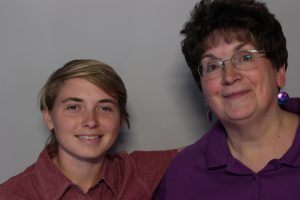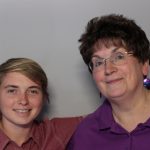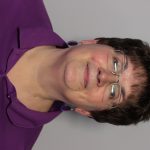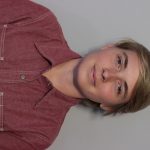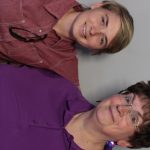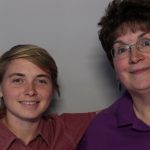Catherine Olmer and Kate Seader
Description
Catherine "Cathy" Olmer (68) talks with her "Wonderlab Baby", Kate Seader (21) about how she got into Physics, what it was like being a woman in science, and her careers as a professor of Physics and teacher at WonderLab Museum working with young children.Subject Log / Time Code
Participants
- Catherine Olmer
- Kate Seader
Recording Locations
Plaza 1AVenue / Recording Kit
Tier
Partnership
Partnership Type
OutreachKeywords
Subjects
Transcript
StoryCorps uses Google Cloud Speech-to-Text and Natural Language API to provide machine-generated transcripts. Transcripts have not been checked for accuracy and may contain errors. Learn more about our FAQs through our Help Center or do not hesitate to get in touch with us if you have any questions.
00:03 My name is Kate Cedar. I'm 21 years old. It is the 11th of June 2017 and we are in Bloomington, Indiana. And I guess I would call I would say that I was your one of your first wonderlab babies as my mom going to
00:26 And I'm Kathy Omer and I'm 68 years old it still June 11th 2017 in Bloomington, Indiana, and I've known Kate all her life as she developed from a Wonder lab baby to an awesome addled recently graduated from Eckerd College. So you want to explain what wonderlab is and how you kind of had the first idea to make this.
00:59 Wonderlab is a science museum for children and their families located in South Central Indiana all we have about eighty thousand visitors a year which might not seem like much for a big cities such as Chicago and Boston butt for a small City and Rural Southern Indiana. It's a lot of visitors a year. We're a nonprofit and the organization started in 1995, which is about when Kate started as well. It started because individuals in the community.
01:39 Recognize the importance of a place where they could bring their children to experience the wonders of Science, and they thought that Bloomington was large enough that they should not have to go to big cities. They should have a place right here in town that would help to keep a very high quality of life for, Bloomington, Indiana in Monroe County.
02:05 I got involved in 1995 and I'm a single person. I don't have any children.
02:13 But as a physics professor at Indiana University, I
02:20 Experienced the love that families with children had for doing science. That's because once a year Indiana University Physics Department would have an open house and we would get about a thousand people coming on that one day to experience Hands-On science. The most frequent question I was asked was when can they come back and they come back tomorrow or the next day and I'd have to say sorry. No because these rooms that were in have to be set up for labs and classes and so on.
02:53 So I'm I recognized immediately when the idea for wonderlab came that it would be well received by not just the Bloomington Community. But South Central Indiana is well.
03:08 All there was several people who had the idea but it originated with Deborah Kent who was a local journalist who got tired of having to drive out of town with her children to go to science museums. I got involved in the early days and and started helping out with doing science research assigns Outreach to Local Schools as some kind of a part-time gig while I was an IU Professor. That means I was teaching classes. I was doing Nuclear Physics research. I was on committees and then I noticed over the years.
03:50 That my commitment to wonderlab and amount of time and effort I spent on it really gave me the greatest satisfaction and the time I spent on that just kept increasing and increasing so I was doing wonderlab and IU physics professor at the same time on until 2012 when I retired from my you and now I'm just all with wonderlab and that and that's great.
04:27 So where were you working? And what were you doing before? You became a physics professor at IU?
04:34 I was an undergrad at Boston University. And before I went to Boston University when I was in high school, I thought that I wanted to be pre-med because I always found medicine fascinating before that. I wanted to be an English teacher for many many years in elementary school. I want to be an English teacher.
05:02 But I hate grammar and at that young age. I thought that it was teachers needed to like grammar. So I look for something else and I wanted to be a doctor but I thought that it really wasn't for me because it's very difficult to memorize and when you're a doctor you need to have so much at your fingertips and in your brain at one time, and I just can't do that. And so when I was just about to go into my freshman year in college, I received a letter from the physics department invited me to go to an open house if they were having just to meet their faculty.
05:45 No, it turns out that when I was in high school because I wanted to be pre-med. I took a Physics course everyone told me that pre-med students had to know some Physics for their MCAT exams. So I took the Physics course, and it was one of the worst experiences in my life. It was utterly horrible. It was worse than horrible. I think I got a c-minus only because he didn't want to give me the D that I learned I had was all set to graduate with honors and it threw me off of that list, so I couldn't graduate with honors. It was just absolutely Dreadful.
06:34 But I remember sitting with some friends in the last day of school and we were all talking about what we were going to do in our dreams and all that and I remember saying that when I went to Boston University, I was going to take some Physics classes.
06:53 And in talking with my friends, I realize that what I hated about the high school class was the textbook and the teacher and the curriculum.
07:07 But I love the the ideas of physics and the methods of physics and the ideas of physics were fabulous. It's just how they presented to me was horrible and so on and so at the time which which I now think is pretty remarkable for a young naive kid with nothing about anything I decide I want to learn more about physics. So I went to that physics open house that the boss University Department had and I met some really cool faculty. I started taking classes I met
07:46 More faculty there who became my mentors and at the end of four years at Boston University. I graduated with honors in physics specializing in nuclear physics with lots and lots of research at Boston University at Brookhaven National Lab.
08:10 And it was to me pretty remarkable after that Dreadful High School experience. One of the things that it taught me was the critical importance of the teacher the teacher can make or break not only the course but also the subject matter and the in the other thing that it taught me was that
08:33 And this is stereotypical as
08:38 The girls is women.
08:40 When we are in a class, it's very difficult. We're not getting good grades. We and I tended to internalize it and I would say to myself that I wasn't cut out for physics. I wasn't cut out to take physics classes.
09:01 And that the problem was with me.
09:05 I think my experience at boss University showed me because I was able to turn that around that the the high school class was bad not because of me it was bad because of the teacher and I was not well matched for which she was expecting that not a lot of people can do that, especially at such thing of an age. I know I just took I'd end up taking physics 1 and 2 my last senior year and I really enjoyed it and I actually did have a female professor as well Dr. And Cox I believe and she was just she was able to show
09:51 We had a class where instead of having lab separately. It was an integrated lab. So we had lecture and lab for 2 hours 3 days a week and it was a really nice way to be able to.
10:02 See what was going on and what she was talking about rather than just kind of like float through lecture and then get to the lab at the end of it. I know I really latched onto the fact that you could boil water until it froze in one of the test. She did where she had it under high pressure and caused the pressure to boil it off and then that Vapor took the heat with it until you were left with just an ice cube. That's so in the glass. That was one of my True Lies adding and I just really appreciate that while in high school.
10:38 I did not really enjoy physics. I enjoyed a couple of the big projects. We got to do like why I know house and stuff but
10:47 I I just kind of skated through and got I didn't really pay attention or like anything from it and it is a very big importance to the teacher. I know when my dad.
10:58 Who is here teaching math before he ended up opening his own shop. He he got a lot a bunch of people. He was teaching math to Elementary Ed majors and you got a bunch of people coming up to him afterwards and was like, oh if I had had you when I was younger, I would not have ended up hating math so much cuz it's just
11:22 I think it's a little harder for math because it is straight equations, but you can fit more things in with a physics, but then again physics is pretty much all math. So not really there's a lots of physics that that is qualitative in the elementary Education Connection for your dad because
11:48 Early on it at Indiana University and I was there for 33 years, but early on there they assign need to teach the introductory Physics course for elementary education majors and the first year. I taught it. I just approached it as a kind of a watered-down version of what we would teach pre-med majors and I very quickly realised teaching it that way was an enormous mistake and that that was not what they needed. What they needed was a friendlier environment where we were looking at the at the concepts and the ideas and a Hands-On way that it wasn't just equation. Sometimes equations are important, but sometimes not sometimes you just want to know is something going to increase or decrease or get hotter or colder or faster or slower.
12:45 And so I continue teaching that chords for many many years and came up with lots of projects at the students did both in class in their Labs at home and so on so that by 1995 when the idea for wonderlab came, I had a huge tool box of projects and activities and so on that could be immediately used by the Wonderland Volunteers in the outreach program. So in a sense teaching that course a really prepared me for wonderlab and terms of the types of activities the types of topics that were totally appropriate for children.
13:33 Of all ages. It's really yeah, it would be really important goes with Elementary Ed Majors. You're not Justino teaching them for themselves, but you're teaching them ways to teach those in there going to be a Gentleman Jack exactly. And so would that course has a huge impact in a way that most classes don't have an impact. I do confess that there were times when I was totally stumped in the early days. I can remember doing an Outreach at a kindergarten and we were doing an activity having to do with floating and sinking and I remember asking the kindergarten child.
14:22 If we had an object, it was floating on the water. I remember asking him if we were to take a ship in a like a ship that floats in the ocean and make a bathtub. That was big enough that the ship could fit in it.
14:39 We had that huge bathtub with the with the chip would the ship float in the bathtub?
14:45 And he said no it wouldn't.
14:50 It would float in the ocean. So I asked him why and his response was that the the water in a bathtub is clear. You can see all the way to the bottom but the ocean water is blue.
15:06 And that blue ocean keeps the boat suspended and at that point, I didn't know what else to say. So he and I just continue doing Hands-On floating and sinking with lots of different objects. And I figured that he has lots of years of classes that he'll be taking after kindergarten work can approach the y a floating and sink now, it's just a matter of investigating what floats and sinks. What does it very well but doesn't float well and so on that said, it's really interesting that he made that comparison because that answer can actually be right. So you do like the density of seawater versus saltwater exactly. And so
15:59 It also showed to me that that teaching science to young children is not easy and one of the biggest decisions that you have to make is what do you not going to teach? What do you not going to?
16:16 Have them investigate because explaining the why behind it is. Is it appropriate for that age level?
16:26 And so that was one of my first activities in the early days of Wonder lab and then in 1998, the intro Museum was opened up in an empty storefront on the courthouse square and then in 2003 we moved into the the current magnificent building. I was 2003. Yes. That was almost fifteen years ago. All right now I feel you feel all
16:59 Yes, exactly. And and now we're getting chilled and coming in who are children of adults who were children in the early days and it's so is wonderful, because we're seeing that that generational effect and that people are supportive of Wonder lab of all of all ages. It's it's not just for little kids.
17:26 So when you were younger or when you were in college of that did you feel did you notice that a difference in what gender was pursuing The Sciences or did you feel or were you ever made to feel lesser or more straight or more strange from subject because you are woman.
17:53 Yes is the short answer in in high school. They were many females who did take the class and once I got to college I was in our class of physics Majors. They were only four of us one female three males, but then the rest of the class was made up of the engineering majors and they were mainly male until I noticed it.
18:29 But
18:32 I am a very stubborn person and I wasn't going to let that stop me. I really loved the ideas and the methods of physics the Simplicity of physics explanations of everyday phenomena in life and just because I was the only female in the class and get taunted sometimes by the male students the heck with them.
19:07 I've had people do things and say things to me that were inappropriate that were hurtful because I'm female and my response is always been the heck with them.
19:24 And moving on doing what am I want to do? I know that as a female that's really hard to do because when when you're in a situation where you don't feel comfortable
19:38 It's so tempting to want to leave that situation and move to one where you do, especially I think in the end of subject matter like physics where at least when I was an undergraduate the averages on the exams would be in the 70s.
19:58 And so if you got a 65% on an exam, I look at that as a d and the teacher saying no, no. No, that's a good score.
20:11 And I'd say but that's a d no. No. No, that's a good score. So it made it.
20:19 Very difficult to really grasp how well you're doing until you get to the end and you see the letter grade. I think some of that is is changing. But again when your female and you don't do well in a class you do poorly on a test, for example, it's so easy to internalized it and say that you're not meant to be a physicist. But stereotypically when the men were in that situation, they tended not to internalize it but instead to blame it on the teacher.
20:54 They probably slept better at night because of that.
21:00 You again that's only a stereotyping things. But as I said, I'm I'm really stubborn and I like physics and I wasn't going to let anything or anyone stand in my way except for me. If I couldn't really do well enough to pursue it. That would be one thing but I wasn't going to let somebody just say you don't belong here and make me leave.
21:32 So you said you wanted me to English teacher and then you should have said to Medical. I am being a doctor and then physics. So when you were younger in high school and things like that, can you remember being able to do the types of Hands-On learning either in the classroom outside of the classroom that you've put most of your life into teaching other kids well in high school
22:05 In grade school
22:07 We did not have very much Hands-On.
22:11 It was mainly textbook learning with an occasional.
22:20 Oh, I remember the day was probably fifth grade when the teacher brought some fungus to the classroom and it was all over all over the place because some misbehaving students were putting it where they shouldn't have put it but I really wouldn't call that Hands-On there really wasn't any there wasn't a lot of Hands-On science learning experiences, but they were some so I was probably this is probably freshman in high school taking biology.
22:57 And the assignment was to go to a pond or lake or somewhere collect some water and bring it back to class to look at it under the microscope.
23:12 To me that was absolute Heaven. I still don't I'm not sure why I didn't go into biology because when I looked at the water and saw all the animals that were living in that water sample, it just open my eyes to
23:32 Do so many possibilities, but when I was a senior I took physics and and that's where my my love stayed but I still think that there would have been enough in almost any science course to fall in love with that. But very few of them had Hands-On. Do you think that
23:57 If you had a place like wonder that when you were growing up, you would have gone into a different science field. What do you think? You will like I grew up in a suburb of Boston Massachusetts suburbs name is Brookline, Massachusetts, and I can remember for some reason they invited several students and me to meet Jacques Cousteau at the Boston Museum of Science. I can remember that about Boston has fantastic public transportation.
24:32 And a one of the earliest memories I have of when I was allowed to go by myself on the streetcars was to go to the Boston Museum of Science.
24:46 And so I would go to the Boston Museum of Science frequently. I am sure that that had an effect on me.
25:01 Do you have a specific person that you think of or you luck up to in science? Either when you were younger now?
25:15 Well, there were two people faculty physics faculty members at Boston University.
25:23 Who I took courses from did research with who had and
25:30 Inestable, I can't even say the word a huge impact on my life and my career one of them is Professor Bernie Jason and the other is professor at Booth. I took introductory physics courses from them and then other higher level physics courses from them and I did research with them. They were incredibly caring concerned faculty who gave me so much of their time and I advise and really served as as mentors.
26:09 We discovered that.
26:12 A lot of the students who came in as physics Majors had experience doing Woodshop or Electronics or
26:25 Building stuff in in Dad's basement. Well, I never had any of that. And for example, when we needed to solder I didn't even know how to spell the word solder let alone how to solder. I didn't know how to use machine shop tools. And so they arranged that the various people in the department gave me lessons in machine shop tools and how to do that so that
27:01 My education was more than just the physics, but it was also becoming trained as a as a experimental assist as a scientist and also during the Summers. I was in a research programs at Brookhaven National Lab on Long Island that also gave me Hands-On experiences that were
27:31 Unequaled in value. I I can't imagine what my life would have been like without them. But I really think that Bernie chasing and Ed Booth where the the ones who lit the spark and nurtured it so that I became what I am today.
27:51 What were some of your favorite Hands-On experiments to do with kids at the Museum?
27:57 Oh gosh.
28:03 So some some experiences are are messy and that's wonderful one experience.
28:15 Involves taking Elmer's glue and and corn black Elmer's glue and basically turning it into silly putty.
28:30 And I just love doing that.
28:35 Doing it with the students in my class of Elementary education Majors doing it with kids in Wonderland.
28:45 And there were lots of other Hands-On activities as well.
28:51 We haven't done it at the Museum because it takes a long time to do but I think it's fabulous and that's growing crystals. So starting with the with the chemical powder dissolving it putting in a seed on a string.
29:07 And keeping it clean over a period of a month to grow a huge Crystal look at 32 inches wide. I just think that's phenomenal and I had students in my class doing that.
29:22 Some other activities could be chromatography. I remember doing chromatography as an undergrad and it was all smelly dangerous chemicals, but in the museum, we do chromatography with water and colored markers. You get the same experience. You can learn the same thing, but in a much more friendly and safe environment.
29:48 The moment you started talking about Elmer's glue and cornstarch. I thought of it as you're talking about it cuz I just seems like the most iconic get Wonder lab experiment. Is that look like I remember down in the basement of wonderlab back when I was at in the courthouse square and the first building I remember cuz there's a basement area like right he went down the stairs.
30:14 Yes and know that we had that's where the offices were where they did like Hardy sometimes I think.
30:20 Or the head like a separate room cuz I I remember I believe having my birthday party at the old Wonderland and everybody was making Oobleck and little paper cups with their popsicle stick and Jamie is try and make it all mixed up together. And that's one of the things the few things. I remember from the old Museum cuz it seems weird to think of that. It's been so long since you've moved into the new building that has become very iconic and it's been nice for me to be able to bring my little cousins down here and they really love it whenever they come down from Terre Haute in to see the different programs that come through.
31:01 And my mother of course pulls out the pictures of all the different things that I've been able to do it wonderlab me and the different animal costumes trying to help and volunteer when I technically shouldn't be volunteering cuz it was like 13 versus feeding. Meet me being like 7 in a bee suit showing the bee dances out on the courtyard for the honey. Bee hive
31:26 It's been a really really great place to grow up around and have a big part in it. And I know that if volunteering there hadn't been such a big part of my life. I probably would not have had the degree would not have gotten the degree. I did get what degree did you get? I got by a ended up switching from Marine Science into a biology degree from special any specialty in integrative biology. So they offered like microbiology and I believe I chose it and then I didn't get pricing on anything interesting biology but it says they have three times to choose from is microbiology integrative biology. No, sorry. I have integrated and it's integrated between I believe ecological and organismal biology.
32:16 I did a class in microbiology has like no, thank you. You're interesting when it comes in the concepts with things that I do but in terms of making that my whole concentration just couldn't see myself doing but remember class is only what the teacher has made of it. And there's so much more than that. I'll know it was a really was taught by a really good professor. She actually was my mentor and I really enjoyed it. But it was I enjoy dealing with those Concepts in relation to other things like instead of making my whole degree about how things function in a Cell I enjoy learning what is going wrong in the animal because of something is going on in the cell in like connecting in rather than focusing on it. I can't wait till
33:05 10 years from now twenty years from now you are on the the bench where I am and somebody is interviewing you about your career. And and what led you down the various paths. That would be a time of a story.
33:24 Is a little of strains of a combination of Science in theater and national parks and search-and-rescue and
33:36 Who knows where I'll end up but it'll be interesting. It's great. You've been apart of.
33:43 The hobnob that's my path. So
33:47 I'm really glad that you had that it's been a pleasure because I look I look back on my life right now. I turned 69 next month. And so at a time like that. It's it's only normal to look back in and say what was the what was the best part of those 69 years? And and what are you what are you leaving behind that can make a difference and although I really enjoy doing Nuclear Physics research. It was it was so much fun.
34:19 Realize it was fun because of the people I worked with but that over my life. The one thing I've done that has made. I think the most just had the most impact.
34:34 On me on others on the community has been Wonder lamp. And so I look at that as something that I'm that I'm leaving behind that is just going to affect millions and millions of children and schools and families and I'm I'm really happy about that. But I wonder live had its 1 millionth visitor last year and I just think that's that's so incredible because I can remember those early days when we didn't really know what we were going to be doing and we would talk with people about wonderlab and they would say what's 1 to life. We don't need a museum people should just go to Indianapolis if they want to go to a museum and so to see how it has evolved over. All those years is just makes me feel so so proud of the community and Mike and my colleagues at wonderlab of what we've accomplished and and what it will mean for generations to come.
35:37 And that will be your turn as well as if you as you find that one thing in life, that sounds like City Slickers movie, but you find that one thing in life that just gives you enormous pleasure and pride and that means a lot of worth living and lived well and don't don't rush into it try lots of different things because certainly when I was young I never would have thought that it would have been Wonder lamp if I had I probably would have done some things differently. I would have taken business classes that I didn't take and
36:21 Experience lots of different things and you'll find that one thing that makes it all worthwhile.
36:30 What's the plan?
36:31 Good.
36:33 And then come back to wonderlab because there's always something new and and great going on here. One of the things working on right now is that is a new exhibit area for children from birth to 3 years old. And so I just I look back at in the early days of Wonder lab when
36:57 We were starting to think what what what age is need need science experiences and and the answer is all ages actually birth to three through 8 through high school and and on into adulthood and that's what wonderlabs going to provide.
